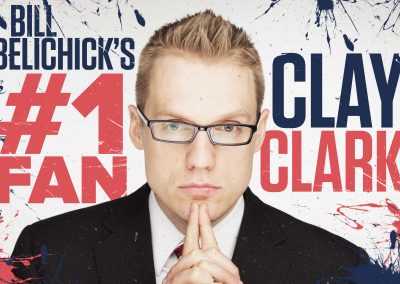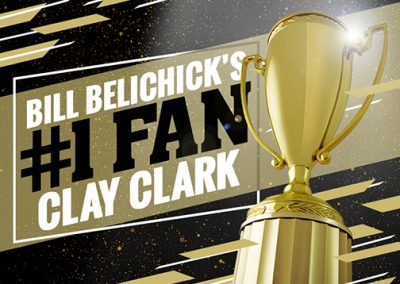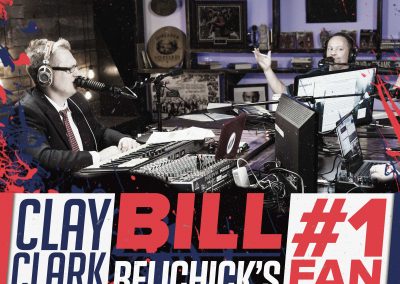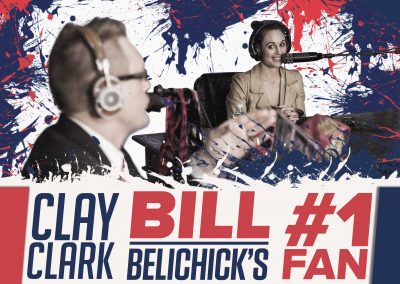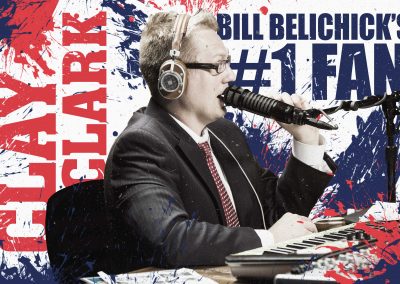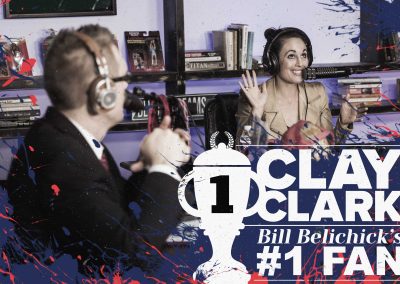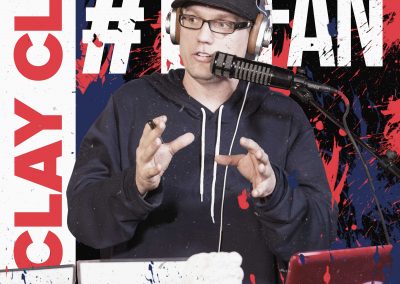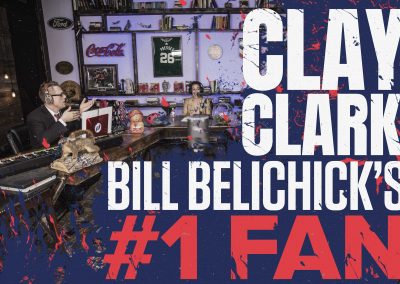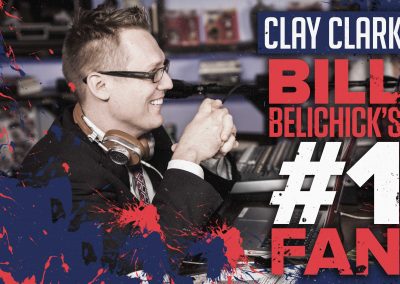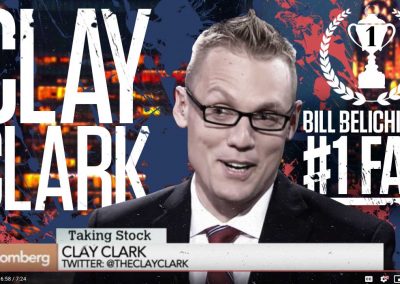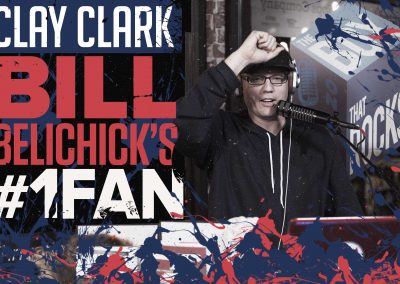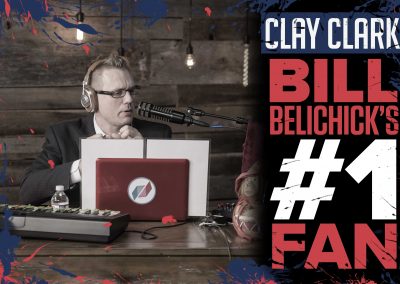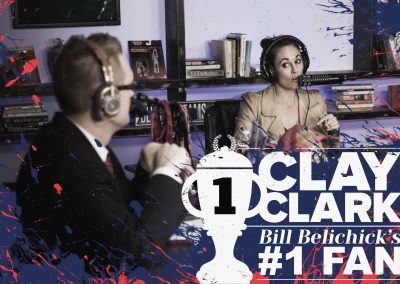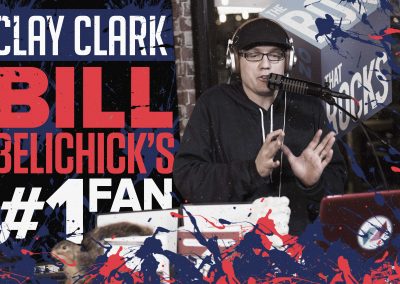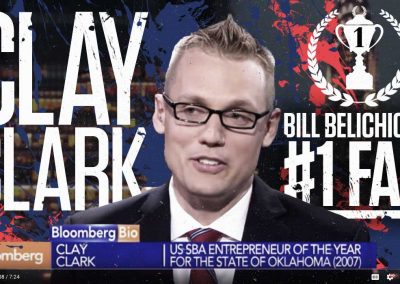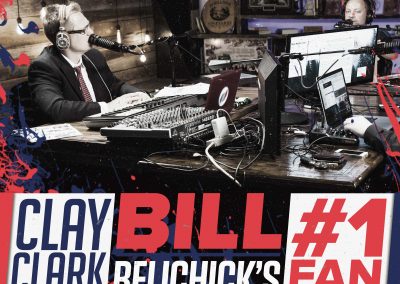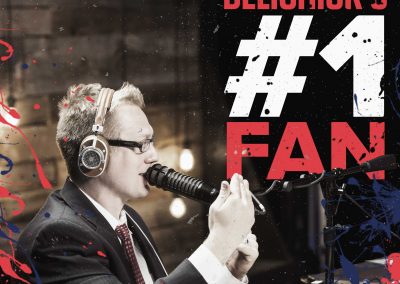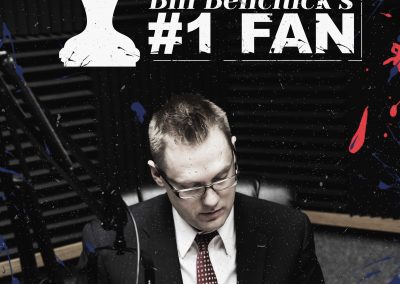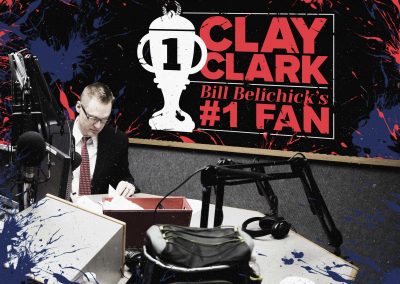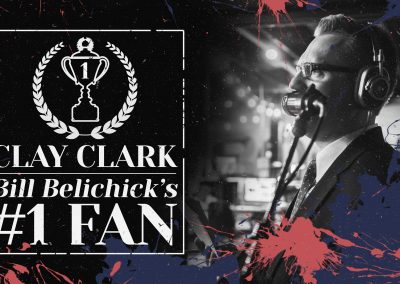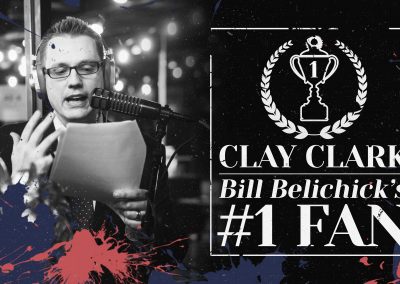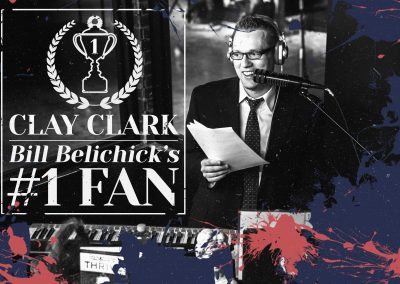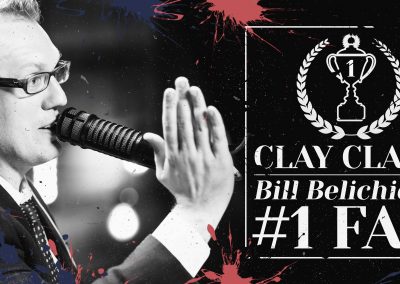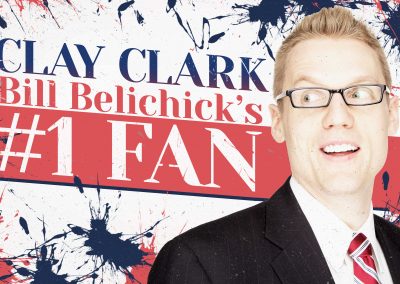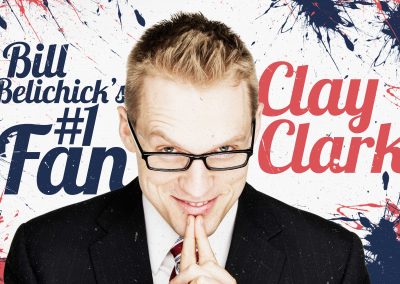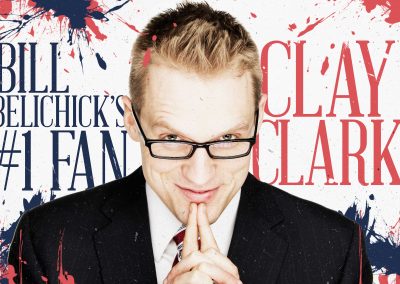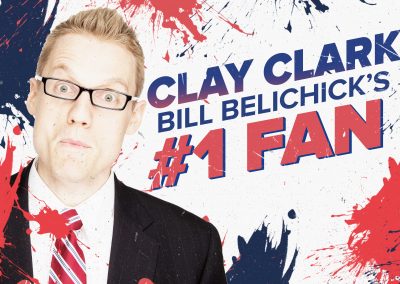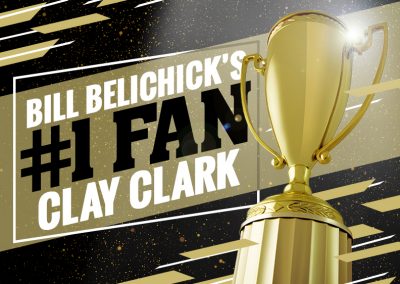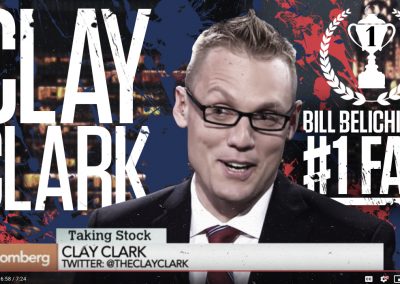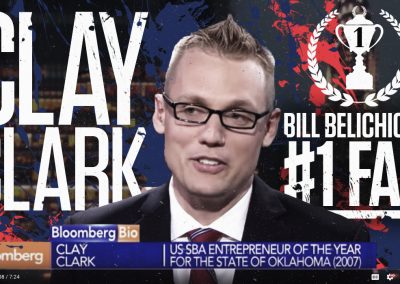Business Coach | Do Your Job | A Look Under The – Hoodie Part 2

Audio Transcription
During this training, Bill Belichick’s number one fan and America’s #1 business coach Clay Clark teaches many of the management principles that coach Belichick lives by. Clay Clark and Dr. Z are here on this episode to teach you Bill Belichick’s management principles. Yesterday they introduced the first 5, and now they want to unveil the last five of the masters plan.
Podcast Transcript
Clay Clark: All right Tulsa, T Town. Welcome back to The Thrive Time Show. We are heading into a Super Bowl Sunday, and Dr. Zoellner, I could not be more excited. It’s a Super Bowl Sunday. My wife now is even wearing the Patriots gear. Vanessa, are you excited about your Patriots gear heading into the Super Bowl?
Vanessa Clark: Yes, you texted me out when we went to the Patriots game, there’s a store.
Clay: I marked in and said anything that you guys can sell me, please sell it to us. Now, we’re all ready, we’re all adorned in our Patriots gear. Every night Z, we’re watching a different documentary. It’s getting rough though because we’ve watched all of them because I am Bill Belichick’s #1 Fan. Now, we’re watching like the boot leg, like 2004 Super Bowl road to victory video. We’re watching all the Patriots documentaries we can about players who are no longer on the team except for Tom Brady. We can get ourselves ready to go psychologically.
Robert Zoellner: Except for Tom Brady. How many were on the team from the last Super Bowl a couple of years ago? There was not that many out there.
Clay: Well, Edelman is still there, Brady is still there. Wilfork, their big defensive stalwart, that guy has moved on to the Texans. Their running backs have moved on. Most of the guys, it’s almost an entirely new team every time. They had a really-
Robert: I’m going to Google that, because I think there’s four, five, or six or something like that.
Clay: Well, I will say this, the Patriots in terms of winning percentage, Z, from top NFL teams who win the most games. They generally have the fewest number of all pro players, all star players, of those that win. They’re very a much of a non star-studded team. They have a lot of interchangeable parts, my friend. But, how many hold overs? Did you find, did you consult Google blogs?
Robert: I’m looking it up right now. I’m trying to figure how to Google that or Bing it, or whatever you do.
Clay: Meanwhile, I have a show to run over here.
Robert: It’s also pretty exciting stuff, because 2017 it’s February, and you know what happens in February don’t you?
Clay: Is it National Bake Beans month?
Robert: Could be.
Clay: Presented to you by Oklahoma Joe’s?
Robert: Could be, but there’s more.
Clay: Is it National Burnt Inn’s month, presented to you by Oklahoma Joe’s?
Robert: Could be, but I believe there’s more.
Clay: Is it National Bank month, presented to you by Regent Bank? Is it any of these — I’m trying my best here.
Robert: All of the above and more. There’s even more.
Clay: How could there be more?
Robert: Well, there’s two significant things going on in February that you need to be aware of young man.
Clay: Are you celebrating a birthday?
Robert: No, I’m not. The two things, one of them deals with the young lady in between us, and yes. Could you see there’s — I’m not sure you came up with probably some chocolate company. There’s a special, special holiday in February.
Clay: It sounds a lot like Valentine’s Day?
Robert: Yes, you better not forget that one Bucky.
Clay: Okay, yes. I’m playing this music all week, just to get myself ready to head in the February.
Robert: Because it is February now. It’s a month of love.
Clay: A lot of love here.
Robert: [Spanish language]. Then the other thing that you need to make sure is on your calendar-
Clay: What’s that?
Robert: Because you’re speaking, that is our second in person workshop for the year. So, 2017 we’ve kind of committed to doing one a month.
Clay: Once a month.
Robert: We did our first one a couple of three weeks ago, been a success, sold out. You would know if you were there.
Clay: Yes, absolutely.
Robert: Yes, and we had an overflow crowd for the next weekend in fact, it was so popular. Our next one is February the 24th, and the 25th.
Clay: The great thing about is, it’s two days long. Its 15 hours of power. We start at 7:00 AM. Vanessa, you were there. For the folks who couldn’t see firsthand, could you describe the festiveness, the pageantry, the overall accoutrements, the decor, the atmosphere, what people learned?
Vanessa: Well, first of, it takes place actually at the very office that we broadcasted this show from. It’s really pretty cool you get to come to the Thrive15.com headquarters. Which you know if you haven’t been here — It really is — I think it just embodies Clay and Dr. Z. The whole ambiance does, in the startup of all their businesses. I think its super cool, so there’s a great environment. You’re going to meet other business owners who think just like you, and are trying to navigate their business the same way you are. It’s a really special — you don’t get to do that all the time.
Clay: I don’t mean to take the room down, but I just want to be emotionally sensitive. A lot of entrepreneurs out there, being an entrepreneur could be kind of lonely because you’re out there, you’re doing the books, you’re doing the sales.
Robert: Are you lonesome tonight?
Clay: Tonight. And the thing is, I’m going to work out my Elvis. Are you lonesome tonight?
Robert: You’re in the building. I’m in the building.
Clay: They have that deep vibrato going. You know what I mean? Are you lonesome tonight?
Robert: Let say, he was a very lonesome man. Because, he didn’t have a band, a group of guys in like other superstars that acted as a team.
Clay: He’s a biggie.
Robert: Just him.
Clay: The thing is, as an entrepreneur, you can relate to this. When you started your optometry clinic, bottom line you can’t necessarily be best friends with your teammates, because you have to hold people accountable. It’s a general rule when you’re choosing friends. You’re not, “Yes, I want a guy who holds me accountable and coaches me all the time.” You have to get friends outside of the business, but you’re working so much to build the business. Sometimes people get almost reclusive as an entrepreneur. I think on a therapeutic level, it’s nice just to meet some people like you who are going through the same crazy game called entrepreneurship.
Robert: What you’re saying is, is that February the 24th to 25th, I could show up and meet birds of a feather. I can have two days of awesomeness. I can have no upselling, no jackassery, no scamming. What if I cannot afford to be in their scholarships?
Clay: This just in. We have a scholarship available. What does that mean? I’ll just tell you a story. We had a wonderful guy that came up from the Upper Midwest, who, the cost of a ticket for him to get here from his state was fairly expensive. What we did is we bridge the gap, and he was able to get here for a couple of hundred bucks. He’d said, “Man, the whole thing was game changing. If I have known that this was a thing — it’s like I’m probably going to come once a year now, man. This was like a game changer for me.”
Well, the other guy from Wichita who drove down here with his partner and his partner was like, “I get it now. This is exactly what we need. We see this all the time, and this the Thrive Time Conferences are absolutely game changer.” They’re trying to be momentum creators in your business.
Robert: Well, we’re obviously big advocates of it. It’s a program we’ve put on, because you wanted it. You wanted to come here in person and check this thing out and then also learn directly from us. That’s why we’re doing it. But, the other thing that’s very, very important about it, the very important about. It’s that there’s downloadable, its hands on. It’s not like you’re just going to watch a movie. I mean it’s not like you just show up, we’ll give you popcorn, you’ll sit over in the corner and you just sit there and veg out and-
Clay: Carl, why are you asleep? Carl, wake up.
Robert: ‘Imagine your [unintelligible 00:07:00] I think this is going to stop, this exciting part.’ No, it’s hands on. Its downloadable, you leave here smarter about business than when you showed up.
Announcer: Broadcasting live from the center of the universe. You’re listening to the Thrive Time Show.
Clay: Now, Thrive Nation. What we’re talking about today, today’s conversation is from my newest book called Do Your Job. A Look Under The Hoodie of Bill Belichick. Who’s that? He’s the coach, the head football coach of the New England Patriots who are competing to win the Super Bowl this year versus some other team that I can’t remember.
Robert: Is this sports radio? Am I on the wrong channel?
Clay: No sports radio.
Robert: Is this sports radio? Why are we talking football?
Clay: What we’re doing is this guy has had a consistently winning team, for almost two decades with a roster that turns over almost every year in the salary cap era. Think about this, if you’re the best team in the NFL. So, I’d say like this year, say you’re a Cowboys apologist, let say, that you love the Cowboys. Well, the Cowboys this year, because they had such a good year. Seriously, they’re like what, 12 and four? Something like that. They had a good record this year.
Robert: Their last three games.
Clay: Three games, so 13 and three. The thing is, because they did so well, this year, they are going to have a more difficult schedule. That’s what they do in NFL’s, deciding to create parody. So, their schedule is going to be more difficult, and they don’t get the best draft picks. If their team is terrible, you get the best draft picks. When you win every year for 20 years that means you always have the most difficult schedule and you always have the least favorable draft picks. It’s either A, it’s a system. Or B, it’s a bunch of luck. When you do it that long, you just start to realize it’s a system.
Z, we’re going to teach these management principles today. So, here we go. Yesterday, we talked the first five management principles of Bill Belichick.
Robert: Won’t you go over those real quickly and entice someone who says, “Oh, I missed yesterday’s show, now I know I can go to ThriveTimeShow.com and catch it? Won’t you give him a little flavor what happened yesterday?
Clay: You know what I’m going to do? I will do that when we come back from the break. I don’t feel totally empowered to do so yet. I don’t have that psyche. I just want just a little push back. I don’t feel ready emotionally yet.
Robert: You are feeling your own today. It’s February. It’s a new month. You’re a little froggy, Froggy February.
Clay: I just don’t feel like it be appropriate yet. I feel like people, the profundity of those first five could blow the human mind. We don’t have enough duct tape in Tulsa to tape everybody’s brains back together. So, we’ll be begin with the 6th one. Here we go. Make internal training difficult on your team.
I’m going to give a notable quote. I want Vanessa to unpack this because Vanessa you see this happen all the time. Bill Belichick says this, he says, “My personal coaching philosophy. My mentality has always been to make things as difficult as possible for players in practice. However bad we have to make them, I make them.”
Now, Vanessa, you cheered on a very competitive level in high school, where did you go to school for the people out there who don’t know?
Vanessa: Well, in [unintelligible 00:09:47] Kentucky [inaudible 00:09:48] high school.
Clay: Why does this part manual sort of a notable thing in terms of the big cheering world?
Vanessa: I actually don’t know how they are now, but back in the day — it was like the dynasty, we were the — in high school as much as you
can be the Bill Belichick of the — where you just win everything
Clay: You guys won every year that the largest competitions for cheerleading what are the competition cheerleading?
Vanessa: As for those in the cheer world the NCA is the competition down in Dallas.
Clay: The NCA you’re basically you’re competing in the NCA tournament and you guys are winning successfully. Talk to me about the temperament of your coach I mean what was the coach like what was the coaching like then?
Vanessa: Just like it in a business, where you want to have your team United he and also this works as a mom, or anything where you want the people there’s dissension in a group. I think that you can always become the bad guy and at least everyone will be united even though they’re united against you that was a common thing that he did I use that with my children.
I think in business we do that sometimes I see — you use different strategies to get the team united at least that there all together now.
Robert: I did that. I used to do that back — I was a camp counselor camp talk a talker back in 1984
Clay: Camp talk a hawker?
Robert: No camp talk a talker — it’s a YMC camp of Fort Gibson like just 45 minutes outside Tulsa and one thing I was in charge of that the 10 year old boy. I was a cabin leader — leader of a cabin.
Clay: Wow.
Robert: One session, I got this unruly eclectic mixture of young boys, and they fought like it was the Civil War and the world war two mixed together. I was like, “What am I going to do?” What’s the move the move is, “Hey guys pack your stuff we’re going camping,” What? Yes in the deep woods, “What, what, what?” Yes we’re going out there and you take them out there and you just scare the pants off the kids—
Clay: Freak them out-
Robert: Yes, you just freak them out. And all over a sudden they’re united they’re like, “Okay it’s us against all the wild bears out there all the wild-”
Clay: “It’s so scary out here.”
Robert: “I’m scared Billy, I do know I was a bit mean to you, but you can’t — let’s just back up to each other right there-”
Clay: I want to give you a Bill Belichick’s story that blew my mind. Years ago this is about actually about two years ago, there were horrible storms that we’re going on during the summer training camp, and they were asking like, “What are you going to do and basically can you practice indoors?” He’s like, “No, with the big storm I mean it’s supposed to be wreck and rain. We’re going to practice outside and we’re going to extend the practice.” All the players practice with wet footballs and there’s torrential downpour and the reason why he does it is because when the game happens and the inclement weather happens they always perform well in bad weather.
I would just say when it comes to running a business, when it comes to building a call center as an example if you have somebody on your team who needs to answer the phone and by the way customers will occasionally have questions or they might be upset or they might be difficult or whatever it looks like you want to have role played with your team and have been super difficult with them. So, no matter what crazy question or crazy situation they might run into, their prepared for everything.
It’s that preparation that intensity of preparation that makes it very easy for somebody to succeed in a call center. But, if you take it easy with him on training and the training is I just basically a cakewalk then when the customer start calling you see bad things begin to happen.
Robert: Yes, you’ve got to make practice more difficult than the actual game time. If you do that, when game time comes along they’ll be like, “Oh this calls no thing, I got this one.”
Clay: Then I’m telling you what Thrivers, if you’re listening right now and you’re saying, “I don’t know if my team is prepared to win.” You want to stay tuned because we’re going to get even deeper into how to prepare your team to win in the game of business.
Alright Tulsa welcome back to the Thrive Time Show on your radio, Chattanooga welcome back to the Thrive Time Show America. Welcome back to the Thrive Time Show — other countries welcome back and other planets we have – Z, rumor has it we have people on other per actually life-forms on other planets that are tuning in using their some type of cosmic radio signal — system it’s very complicated.
The listeners and myself could not possibly understand the profundity of what it means when aliens begin to tune into your program.
Robert: [laughs] Well, we know what you want. But, we are not sure the planet that you’re from, but we know you’re not from here. I’d like to clarify something real quickly Clay.
Clay: Sure.
Robert: In the last segment I talked about being a camp counselor and scaring the kids, if you were out there 1984 when those young people I hope you’re not scarred by that. But, it was really adversity is what I was getting at. I know right now people are probably calling DHS and they’re probably scrambling right now going “Oh my gosh that’s Billy-”
Clay: The part of the story that Vanessa and I have taken issue about, is just we were just talking of here, is the part where we’re both very offended by — is that when you decided just to leave them out there and never went back. Tell us that part where they just sort of over the line-
Robert: “You kids get it together I will leave you out here-”
Clay: They did make it back safely?
Robert: Everybody made it back safely, everybody was accounted for and to my knowledge I think all of them are pretty healthy mentally at this point. So, in they’re alive. I haven’t checked on every single one of them but I-
Vanessa: You toughen them up?
Robert: Yes, I toughened them up. I pumped them up made them strong.
Clay: Now thrive nation, here we go today we’re talking about did these kind of the management principles that Bill Belichick is using on the sidelines on a daily basis on a weekly basis for decades to make the Patriots consistent winners. I have written a book here recently called Do your job or Look under the hoodie of Bill Belicheck and we’re teaching his 16 management principles.
On yesterday’s show, we went into the first five principles and I’m going to recap those for you. Principle number one is higher character and trained skill. Principle number two is, build your success based upon repeatable systems and not individual talents, you want to build a company that successful based upon the system’s you built, not based on the Super Talents of an individual. Next thing is you want to do the right thing for the team, you always want to put the team first.
Point number four, don’t allow yourself or the team to be distracted you want to be distracted away from the main focus. Principle number five, is you want to have a bias for results. It’s got to be about getting things done that manner. Now, Principle number six is you got to make internal training difficult on your team. Z, I have a little bit of a story here for you and Vanessa you’ll see it happen firsthand. I’m going to tick it up here. Here we go.
Robert: Is this story time?
Clay: I think its story time—
Voice over: Story time.
Clay: Alright so typically whenever we hire somebody who wants to come work in our office, to do videography or photography. I’ll talk to him and I’ll say, “What are your aspirations?” Most people according to Forbes 57% of people want to start or grow a successful business at some point they want to start a business.
Robert: It’s a thing.
Clay: Most people today will say, “Oh, eventually I want to own my own photography company.” I’ll say, ‘okay, here’s the deal. In order to be successful in the world of photography or any other industry, you’re going to have to learn how to sell. If you want to come work photography here, I need you to start off making outbound cold calls.
Robert: “Wait a second bro I’m like an artist you don’t understand I got published in our high school newspaper, and they went on really well people told me I’ve got talent and skills.”
Clay: You see that’s what happens is people feel like, “Okay because I was featured in my local high school paper and I was told by my counselor that I have certain talents and skills, I don’t need to start off at the bottom, I want to start up at the top and you see I’m too good for sales talk.
Robert: I started at the top now I’m here.
Clay: That’s it, Z. People feel like, “Hey I have a degree, so now I’m too good to start in sales. I want started management. I’m too good to start in search engine because I want to start in management.” I always start with I want to make sure he’s humble, and coachable, and trainable. So, I start everybody at the bottom and what that does is it makes things a little bit difficult to the new person but you can see quickly whether they’re going to sink or swim.
Also it shows you their attitude what kind of character they have. Vanessa you see me do this all the time.
Vanessa: Yes, typically all sorts of people will come in and a lot of times they start off doing SEO. Yes, we need a SEO you don’t need to be a genius to do it. But it’s something that is soul-sucking it’s just “oh is there so much in it”
Clay: Search Engine Optimization, is which was she’s referring to as SEO it’s quite a — Just so we’re clear, if you want to know how to get to the top of Google. We will teach that at our two-day workshop, on February 24th and February 25th you can get more information about those at drive thrivetimeshow.com. But it is very difficult to get to the top of Google if you’re not following a proven system. One of the proven aspects of the search engine optimization is whichever site has the most content gets to the top of Google.
Let’s say, that in your mind you’re the top dentist in Tulsa. You believe you’re, people have told you are. You’ve been a dentist for 25 years. Well, guess what? If you’re not top in Google people can’t find you. So, we have to write copious amounts of content about your dentistry, to get you to the top of Google and that’s not very fun to see I just sent your SEO report.
Robert: Well, the thing about it is that they don’t go to — they don’t very often go to page seven on a Google not very often.
Clay: Did you see your search engine report, I sent your way did you see that?
Robert: Yes, it was awesome.
Clay: So, we’re moving on up. And I like to think that you should be the top in Google for Tulsa optometrist because of your beauty. If I look at you I’m going “That’s a man that should be topping Google–”
Robert: I have a face that’s built for radio.
Clay: Then I said it’s based of a following canonical rules and following-
Robert: There you again.
Clay: -following mobile compliance and having the most content. That doesn’t feel very fun, but that’s reality. If you’re listening right now, I’m just telling you when you bring in somebody into your officer here’s the action step. Make sure — don’t hurt him or anything. Make their job difficult make it — push the envelope a little bit where you can really see the level of character the person has quickly because you really want to fire fast, if they’re not the right fit.
Robert: Absolutely, I’ll tell you what when things are going well that’s really no measure of a person. I’ll be honest with you. When things are going well when you’re not role playing really tough with them, when you’re not putting them in a scenario that is difficult for them and you’re not mystery shopping with that person-
Clay: “I have some difficult decisions to make here. I want to have chocolate ice cream or mint chocolate chip that’s difficult as well as well in varsity.”
Robert: That’s tough choices for some people to make. But, the thing about it is. When you apply that pressure, one of the two things is going to happen. They either are going to shine-
Clay: Going to shine or they are going to not shine?
Robert: -Or they are going not to shine. [laughs] Trying to think of something that rhymes with shine, what rhymes with shine?
Clay: They are going to drink a lot of wine?
Robert: That could be well, you might-
Clay: They either are going to shine, or drink a lot of wine.[cross talk]
Robert: Shine or not, fine. I’ve got to come up with a rhyming word for that.
Vanessa: That’s a hard one.
Robert: It is. Sometimes my Dee Jay skills are not quite what Dee Jay Clark is.
Clay: They are going to either shine, or they are going to be a donkey’s behind.
[laughter]
Clay: What do you think about that one? Is that workable? Can you put that on my shirt?
Robert: That’s exactly, where I was headed with that one.
Clay: [laughs] Nice.
Robert: But the point is you can — you’re right. You can figure out whether you want to keep them on your team and pour your time and effort and resources into this person. Because that’s what it is. The ability to build a fire fast is something that a lot of people don’t — It’s a secret weapon they just keep buried in their pocket. Just like, “You know, I’m going to give him a chance another day.”
Clay: We have a caller calling in right now. We have a caller. We don’t normally take calls on the show. We’ll be talking about in the future, particular if there is any — we’ll answer any business question that you want typically. Right now, you just email [email protected]. But, allegedly someone didn’t turn the ringer off. Since we’ve got the phone here he has a comment to make about today’s show.
Robert: A comment or a question?
Clay: It’s a comment or a question, I don’t know.
[laughter]
Clay: He made it to the call screener.
Robert: Well, put it through.
Recording: I’m a scientist, I’m not an expert in football measurements, just telling you what I know, would not say that I’m Mona Lisa Vito of the football world, as she was in the car expertise’s area.
Clay: Apparently, Bill Belichick has just called in there and he wanted to comment about the deflated balls. He wanted to comment – apparently, he’s not a scientist.
Robert: Yes he’s not a-
Clay: He doesn’t know that.
Vanessa: How could he not, we’re going through his book.
Clay: [Laughs] All right now thrive nation, here we go. When we come back, we’re going to get back into the Bill Belichick check management mastery. How do you become a master manager? Stay tuned thrivetimeshow.com.
[silence]
All right Thrive nation, welcome back into the inspiration conversation. Where we teach you how to start and grow a successful business. Z, February is the month of love and we’re going to show love for you the listener by hosting another in person two-day workshop, on February 24th and 25th. That’s February 24th and 25th, and a true story we had a thriver that just came up here from Dallas. He was on the show yesterday, Thomas and he was telling us that he came up here. Do you know where he went — what are some of his first tourist destination that he went to when he was in Tulsa?
Robert: He probably went to Oral Roberts University. That’s our number one tourist attraction actually.
Clay: You would probably be correct if that’s where he went. Because it’s not where he went [background noise] you did not. But that would be a good guess. He went to Oklahoma Joe’s.
Robert: Of course he did. He was hungry and wanted one of our barbecue.
Clay: And then he went over to Barbie cookie. He’s visiting our guest. Z, we are now becoming Tulsa’s number three tourism draw. Number one is the praying hands. Number two-
Robert: Which is at Oral Roberts University.
Clay: If you want to get specific and accurate.
Robert: Yes. Okay.
Clay: Move number two is the Sod farms. There’s a lot of people coming to see Sod farm tours. It’s amazing, they are catching on. The third is thrive time-
Robert: It’s tough grass, that’s just exciting.
Clay: Hey man, we’re going to look at over here if you look on this left side here. Put the green side up over here. Now, over here we’re also do that green side up. We do and either way it’s always green on top.
Robert: Now, I tell you when I buy the sod it’s going to be the piece right here, right? I’m walking on this, I’m looking at this, I’m feeling I want this piece.
Clay: I have a Sod story here before we get into our next principle.
Robert: A sod or a sad?
Clay: A sod.
Robert: Okay. Sod.
Clay: I don’t know if I’ve shared this story publicly before. Basically, when I was — I want to say 12 or 13. I was living there during the summers. I was staying with the Gathman family, and with the Montag family. These two fine families from Broken Arrow, I was staying with them during the summers. My parents lived up in Minnesota. I would come down to Oklahoma to visit some friends. So, I’m staying at their house. My buddy Chris has a job working on a Sod Farm. The way it works on a sod farm — I’m sure it’s not that way now. Back in the day what happened is you would just show up. Like you didn’t have — you didn’t show any ID or you didn’t have any-
Robert: You showed up.
Clay: Yes. You would just show up at the intersection of about 91st [uninitelligible 00:24:51] that quick trip. 91st and 145th I think. Elma?
Vanessa: Ashburn is 145th.
Clay: Ashburn Yes. 91st and 1oo–you said-
Vanessa: Ashburn.
Clay: Ashburn. You show up over there. What you do is just get in the truck and no one asks for papers or IDs or identification or insurance rate. You just show up and Zoe, I’ll tell you what, I was one of the best solders for about seven days and I got to use my machete. They gave me a machete — no one got injured. Then, I ended my sod career.
Vanessa: I wonder if you showed up now, if they would take you. If they are still doing this?
Clay: Are they still sodding in that area?
Robert: I believe so.
Clay: I think there’s a bronze there now.
Robert: No wait.
Vanessa: I don’t know.
Robert: Well the area, I mean the areas — is an area. The area is just-
Clay: If you rip up that concrete you could start a sod farm again right away.
Robert: You could start one right then but I tell you what now, today is February the first and since 1887, tomorrow morning-
Clay: Tomorrow morning.
Robert: -we have been celebrating something in the Unites States of America.
Clay: Is it birth of the groundhog.
Robert: The Groundhog Day.
Clay: Groundhog Day is where there’s a hog and he spends his time in the ground, and he comes out of the ground-[laughs] and you know what, he’ll look around I’m using a hand puppet basic line. Here we go “I wonder if there’s do I see my shadow? Do I not see my shadow? I don’t know? I’ll head back to the ground” The hog gets back to the ground and that’s-
Vanessa: I don’t know how accurate that is.
Robert: Okay. You redeemed yourself you started weak and you finished strong. I’ll tell you that right there. But, the groundhog comes out of his den and if it’s a cloudy day, he doesn’t see his shadow, then spring is approaching quickly and if he comes out into bright sun shinny day and he sees his shadow he ducks back and we have six more weeks of winter which we technically have winter confirmed. Winter could last longer then.
Clay: Vanessa, I want to get your take on this. How big of an impact to you as a female, as a mom, as a wonderful lady — how big of an impact does Groundhog Day have on your life. I mean, it’s got to be a huge thing.
Robert: Huge thing.
Vanessa: Well, yes it just slipped my mind completely. I was surprised you said it was a hog.
[laughter]
Robert: That’s it Vanessa, I’ve got a very serious question for you. I know all the moms out there listening, probably will be curious themselves and all the dudes listening too out there. So, we have February and which day is more important to you. Groundhog Day or valentine’s day as a woman.
Vanessa: That’s a tough one. I guess I’m going to have to go with Valentine’s Day.
Robert: Oh, men, I was-.
Vanessa: A little bit more exciting.
Robert: – I was 50-50 on that when that one played.
Clay: Why would you celebrate the hog that comes out of the ground?
Vanessa: It’s a hog
[laughter]
Clay: It’s a groundhog.
Vanessa: I love that it’s a hog.
Robert: That was my great movie by the way. But today folks we are — in the fields they had these teams called football teams. You may say to yourself, “This isn’t sports radio.” But there’s one that stands out as excellent in their management and the way they run their team, because if you ran your business the way the patriots ran their team, you would be — you would have plenty of money and you’d have plenty of free time and that’s what we’re all about. We have a huge business growing, growing and growing because this guy — it’s unbelievable. His management systems which were breaking down restarted yesterday — we’re getting to some more today. We have 16 total right? The books he wrote?
Clay: 16 total
Robert: 16 total and we just finished up number six and we’re ready to go to number seven. Aren’t we?
Clay: Yes. I wanted to give you a quick Bill Belichick trick fun fact point.
Robert: I love fun fact points.
Clay: During Bill Belichick’s time as the head coach of the New England Patriots he’s been named coach of the year three times. 2003, 2007, 2010 and then the years — the thing about this guy is he’s been a coach in the interfiled, for many, many, many teams and people don’t realize he worked for almost a decade in the interfiled as the lowest man on the [inaudible 00:28:46]. He actually started working for $25 dollars a week for the colts as a film dude. Today it’s more or less like 150 bucks.
Robert: Yes. But he did the move which is called interning. He basically said, “Listen, I’m going to work for you for practically nothing.” And that’s the move. A lot of people say, how do I break in into this industry? How do I get my foot in the door? I tell you what, if you walk up to a business you say, listen, I want to come and work for you for nothing, will you let me work? Those are hard to turn away people.
Vanessa: He supported himself with another job, right. He had a long term plan and obviously he didn’t want to stay and do film forever but he supported himself with a second job and then he did what he loved and of course he is now.
Clay: Vanessa you see us coaching with business owners all the time, and you get the chance to see the success stories and the wins. How important is having a long term plan in your mind? For the entrepreneur?
Vanessa: It’s the foundation. If you don’t know where you are going, you are not going to know when you’re, off course and you are not going to know when you’ve arrived and you’re going to look and wonder where you are. So, that’s part of the foundation of wherever you’re going. You need to sit down and make your goals and then it’s our job as coaches all you‘re to help the clients and they direct their businesses in the right steps to get there.
Clay: You know who, Z you know who my life coach is, my life coach?
Robert: Who is your life coach? Wait, wait let me guess, Tony Robinson?
Clay: No, I know since the hot coal injuries, we’ve had to put that on, it got weird. Seriously Vanessa has – I want to tell you, this is what Vanessa — as an entrepreneur’s wife, there’s so many tasks and roles and just there’s so many things we’ve work together and everything. But, one thing that she’s really good about is pointing out things like, hey, why are we going that way? She helps steer the ship, because I’m very much somebody who likes to play hard. I want to go, I want to move, I want to get it done, and I want people just to quit talking about it and let’s go do it. Why have we still been talking about? But, so what she does is she helps me play smart and hard.
That’s the next principle we’re going to talk on when we come back, on chapter seven is how to play smart and hard. So many people are going, “oh, if I just studied this longer, eventually it will just do itself.” You know what, you got to actually play hard, but some people are just so busy, there is like hog in the ground. They’re so busy just being like that groundhog, and then they need someone to pull them out and say, hey buddy, look the sun it’s here. Look this is where we are going Mr. Groundhog, look [laughs].
[silence]
Alright thrive nation, welcome back into the conversation. We are talking today about how to become a management master, like Bill Belichick the head coach of the New England Patriots, who will be competing this, he won’t personally be competing, but his team will be competing this Sunday, Super Bowl Sunday, in the Super Bowl they’re playing some group of random people, destined to finish second. They’ll be playing in Houston versus whoever, the New England Patriots, that’s why unbiased take off this weekend’s Super Bowl festivities Dr. Z.
Robert: Well, I’m glad you’re unbiased because I think the Falcons going to be — I mean, it’s a bit going to be a good game. I have a feeling
Clay: Is that a team?
Robert: It’s like a bird of prey. [background noise]
Clay: Not a very beautiful bird. Well, a patriot is like a, a patriot is a, it gets a great America [crosstalk]
Robert: It’s a deal with the musket.
Clay: Let’s play this out, let’s say that.
Robert: Like a triangle, what’s the deal about that triangle hat? Why was that invoked back in the day? May I have a story on that?
Clay: I don’t know how truthful it is, but I believe it’s the triple threat, its offenses, defenses, and special teams.
Robert: You’re saying that the — our founding fathers back in the day wore those hats, knowing that the teams to be named after them. [crosstalk]
Clay: Let’s not joke around, let’s get serious, before someone will say, I tell this, Thrivers play this out. Imagine that a man with the musket and a hat that was in the shape of offense, defense and special teams that three angled hat has a musket, and he’s competing against a falcon? Who’s going to win that? Obviously [crosstalk].
Robert: He’s got one shot.
Clay: Come on, falcon, let’s do this.
Robert: Of course, the falcon will, he’ll dodge the musket and by the time the guy realize it they’ll swoop out, pick up that little triangular hat.
Vanessa: We do have all the reload time, right [unintelligible 00:33:07] [crosstalk] back in the day.
Robert: Therefore, taking away the triple threat and the falcon went [inaudible 00:33:09].
Clay: We have somebody who’s very, very with ever and the email that came in over the break, and someone goes, are you trying to do the voice of a groundhog? I’m going, no, it’s that a hog that’s in the ground that has lack of testosterone. It’s a, hi everybody I’m a groundhog, that’s where I got for the groundhog right now it’s, hi everybody I’m a groundhog, it’s February the second, this is my second favorite day of the month, it’s groundhog day. Z what do you think about that, is that working for you?
Robert: That’s actually, I think, pretty not accurate, I don’t think there’s a sound like that.
Clay: Okay, now real quick, many people have asked, they said Clay, you and Dr. Z love Oklahoma Joe’s baked beans, but do you really love’em. This weekend I was in my car, with my kids, and I was singing, [sings] these are a few of my favorite baked beans.
Vanessa: This is true
Clay: Then I would sing, I had that, my own sound of music and medley going on.
Robert: That’s lovely, the kids had enjoyed that, I’m sure.
Clay: They did, they loved it and so I just want to know the Thrivers to experience that first hand.
[backgorund music]
Come on Thrivers here we go, get ready. Beans are a few of my favorite things. You see I’m sure that I said beans. Beans are a few of my favorite things.
Robert: Now I get it, I get it, I tell you what, I’m a believer. I am a believer on Oklahoma Joe’s, and if you’re sitting there one or you’re sitting in your car, you’re listening to the show. You’re thinking, oh my gosh, I’ve got to run to lunch I’m hungry, I’m hungry, I’m hungry. If you’re in Broken Arrow, go to Oklahoma Joe’s by the Bass Pro Shop, if you’re on South Tulsa, go to 61st in Sheridan, there you’ll find barbecue heaven [crosstalk] in the name of the Oklahoma Joe’s.
Clay: [sings] Oklahoma Joe’s we’ve got three locations to serve you.
Robert: [laughs] The way the other would dealt down next to the iconic Cain’s Ballroom [crosstalk] cause it is iconic. Probably the number four tourist attraction in Tulsa, we think.
Clay: it’s slightly ahead of that, but I guess it’s a little bit behind the [unintelligible 00:35:03], South Farm, Thrive Time show conference on the 24th and 25th. in the end that you have the, you have Oklahoma Joe’s that’s right there in the top five, Vanessa.
Vanessa: I just love the Mr. Oklahoma Joe’s, him and his wife they’re pretty spectacular into themselves, that’s why I love the Mr. Oklahoma Joe himself.
Clay: I like when he’s there, I just want him to get out the way and give me some baked beans. I love the guy, I love the guy, Oklahoma Joe’s at Great American, but I’ll tell you where those beans he made, those have a life of their own. They have a tractor beam that pulls me to them on a daily basis. Now Thrivers, were talking about management master today, and we’re taking a look under the hoodie of Bill Belichick, if you’re on Facebook live, I’m just going to show you. We’re having a look under the hoodie of Bill Belichick, he always wears these nasty hoodie sweatshirts there.
Vanessa: I don’t know that I want to look under the hoodie [laughter]
Clay: No, you do want to look under the hoodie, there’s no dandruff onto that. That guy is [unintelligible 00:35:51] the great shampoo, he invested into high-quality shampoo. Now here it is, chapter number seven from the book, play smart and hard. I’m going to read you another book quotable and Z, I like for you to unpack it for me.
Robert: Okay.
Clay: here the deal about Bill Belichick. Okay, this guy wants you to play hard and he wants you to play smart. He says, “You can play hard, you can play aggressive, you can give 120%, but if one is out of position, then someone is running to the line and scrimmage and he is going to gain a bunch of yards.” Z, what’s he talking about?
Robert: What’s he talking about is, is being really purpose full and how you spend your day in business. I see that all the time with young entrepreneurs. They are so busy doing busy work. Just the other day, I was talking with someone and I said, “Why are you doing that?” Well, I can’t, if I gave that for somebody else to do them, I screw it up. I said, yes, well I know, but that’s why you inspect what you expect. That’s why you put systems in place, that’s why you’re very clear and what they’re to do.
What happens is, if you — you have a business, and you’re like, well I don’t want anybody to do anything in the business, I’m going to get it done. Yes, you’re working hard, I mean you’re hard at work, you’re doing your entering in all the phones, you’re greeting every — you’re doing this, you’re doing all the presentations, you’ve got it all going on, and went in the day you’re just completely worn out. You’re like, man I worked hard today, but I didn’t really get a lot done.
Working hard is important, but working smart is important too and I think that has to do with delegation and making sure that your team members that you choose to put around you know what they’re doing and are well-coached step to what.
Clay: Now Vanessa, I want to get your take on this in just a second, but I wanted is, I want to break down the word delegate, just for a second. I always tell people, I say, “When you delegate, you get eight.” I say that all the time to business owners and they go, what do you mean? I said, “When you delegate.” This is what delegation is, delegation is when you start of the work day, and when the employee gets there, you give him a checklist or the items that were supposed to do, or they have an accurate job description. They know what to do to start the day.
Voice over: Broadcasting live from the center of the universe. You’re listening to the Thrive Time Show.
Clay: Then they need to ask you as their manager or you as the owner, they need to get direction and clarification from management. We start off the day, we delegate the items, this is what needs to be done, or here’s your reoccurring job. Then you ask them, do you have any questions about what needs to be done today, and you clarify these two things, you clarify your expectations and how you’re going to communicate.
Then, you say, at the end of the day, I’m going to follow up with you. That’s what you do, you delegate you say, this is what you need to do, do you have any questions?, and I’m going to follow up with you at the end of the day. Now, this is where I see most entrepreneurs getting this wrong and this is the part that makes me crazy, it is called abdicate. Now abdicate, rhymes with delegate. Abdicate in the original context meant today, a monarch or a king would renounce they’re thrown. They would just say, [sarcastically] I said I’m done, [unintelligible 00:38:38] happen when you’re there being attack, so they realized, oh no, the castle is going to fall and like where’s the king, where did the king go.? The king was like, oh guys over here, head down here to the dungeon area, I’ll see you guys in a minute. Then he just disappears, he just escapes.
Robert: Yes, it takes off.
Clay: Right, so he’s like, but one last thing before I leave, Z you’re in charge, I’ll be back.
[laugher]
Clay: Then in that way, the guys who leads the charge is not the king and the king escapes, that’s the game plan. Now, abdicate today really means to fail, to a fulfill the job that you’ve undertaken. What you do if you abdicated to an employee, you say, “Employee, I want you to clean the restroom.” I’m not going to follow up, and I’m not going to be available for the questions, I’m not going to be available to train you, to coach you, to help you at all, I just — you’re on your own buddy, and then you don’t follow up. Then it doesn’t get done and then you start to go, well if you want it done right, you got to do it yourself and then you end up in this fail loop where you’re doing everything, and it’s not very good.
Robert: Yes, you’re working hard, you’re in there, you’re cleaning the bathroom, you’re doing the thing, you’re baking the cookies.
Clay: You’re working hard for your money.
Robert: Hard for your money.
Clay: Yes, Hard for your money.
Robert: Then what you’ve done is you’ve continued to solidify the fact that you now have your very own job.
Clay: Job, J-O-B, from the root word just over broke. Now, Vanessa, I want to ask you this here.
Vanessa: Yes.
Clay: Where do you see people getting this wrong and what feed, what encouragement, what tips would you have. You worked with hundreds of business owners with myself, you’ve traveled with me over the planet where do you see the delegation versus the abdication going wrong or maybe working hard versus smart? Kindly coach us through this.
Vanessa: Well, first off — where working hard versus working smart, make sure that the goal you’re going after, this is a worthy thing that it’s big enough.
Clay: Oh boy-
Robert: -here we go.
Vanessa: You’re spending your life and your time chasing this thing, is if you were to reach your destination tomorrow, is it big enough of a goal, because if you’re going to spend the time chasing something or hunting something you should rather hunt an elephant versus rabbits.
Clay: Well, one thing that you did for me early on, when we first started dating I noticed that you were very sage like, a wise woman.
Vanessa: I think that was my word in fact.
Clay: I didn’t even know what the word sage meant, that’s how dumb I was back in the day I didn’t know-
Robert: I think you use that to cook rabbit in fact-
Clay: Absolutely.
Robert: Sage on there and cook it up.
Clay: That’s what you put on the groundhogs when you cook those.
Robert: Well this is not a cooking show. I’m sorry, I digress.
Clay: Could you eat a groundhog.
Robert: Yes I do [laughs].
Clay: Hey everybody don’t eat me, I’m a groundhog.
Robert: [laughs] It tastes like chicken.
Clay: All right, here is the thing though, seriously, Vanessa I remember we were talking about cars one time, and I go, ‘why are they, what is it at certain point why do you need a super expensive car?’ and you were like, ‘if you’re not for something as inspirational, nothing to aim for what would be the point of somebody moving beyond mediocrity.’ and I remember going well just, “whatever” ,but you’re saying it right now, if I’m listening right now and I am not aiming for something big that’s a problem.
Vanessa: I would say so, because you’re going to spend the time anyways, right? You’re just going to spend the time chasing this goal that’s just going to be just something that is just intrinsically fulfilling to you, then yes go after it. But, you’re going to be taking the time, we’ve done this to chase little rabbits, you could spend the same amount of time and chase the big elephant.
Robert: Well I tell you what, you might chase a rabbit or you might chase a woodchuck, because a groundhog is also known as a woodchuck.
Clay: I thought it was a hog, It’s in the ground.
Robert: How much wood could a woodchuck chuck of woodchuck could chuck wood?
Clay: Your brother’s name is Chuck. What’s up Chuck, how’re you doing?
Robert: We’ll see if he sees his shadow tomorrow morning.
Clay: All right, Chuck Zoellner stay tuned it’s The Thrive Time Show.
[pause 00:42:08 – 00:42:24]
All right, welcome back to the number one business radio show on the planet. It’s The Thrive Time Show on your radio. I’m telling you what, some of you said hey you went so fast. But we’d like for you to go a little bit slow, when you’re talking about that whole groundhog thing. Because we had like six people that are e-mailing in they’re saying hey, seriously that they’re e-mailing [email protected] they’re going, “Did Clay literally believe that the groundhog was a hog?” that’s the question you’re asking basically.
No, I’m just having a little bit of fun. I will tell you this, there’s nobody in the world who knows more about the origin of the groundhog, the hog from the ground than Dr. Robert Zoellner. This guy has been Googgling for several minutes and he’s been able to pull up, some fun factoids that the humans out there who don’t have Google cannot possibly find. Z, please educate us about the history of the hog.
Robert: Well the groundhog is a member to rodent, member of a brown squirrel’s society known as marmots.
Clay: Oh wow, this is nice.
Robert: Scientific name of Marmota Monax.
Clay: They were in the Star Wars II, the things that were clinging to the side of Han Solo Millennium falcon, is falcon it?
Robert: No.
Clay: Marmots?
Robert:No it’s not true.
Clay: Warlocks?
Robert: [laughs] That’s not verified, but he also his nickname is known as the woodchuck which we went over last and also the whistle pig.
Clay: The whistle pig?
Robert: Yes, it’s a big deal because as you know tomorrow morning, that little critter parked at Tony field if you will, is going to decide how much more winter we have and that’s a big deal.
Clay: It is a big deal. Thrives, I’m going to tell you this, the one thing that is a bigger deal, than what that we want our groundhog friend is going to discover tomorrow, is the Super Bowl on Sunday in the two teams that are playing, you’ve got the New England Patriots are going to be competing the world champion multiple times champion the prodigious, the best team in America, America’s team, the Patriots a team named out of their patriotic spirit-
Vanessa: Dynasty.
Clay: -has made this country great. The dynasty will be competing against the falcons and so they’re going to be competing out there. There’s going to be slaying the other team. It’s men with muskets fighting its weird black birds.
Vanessa: It’s all-out war.
Clay: It’s all-out war, of man and musket versus birds. It’s not even fair, but the head coach of the New England Patriots, he is known for a couple of things one, for allegedly deflating footballs and two he is known for always winning. So. we have studied what makes him successful as a manager and we’ve distilled it into my newest book called Do your job, A look under the hoodie, learn the sixteen management secrets of Bill Belichick. Oh there she be-
So, we’re going to move into this next one here see this is, principle number eight which is chapter number eight. Understand the strengths and weaknesses of each team member. So, if you’re listening right now what you should do is an action item right now want you to go ahead and pull on over if you can, by the way when I say pull over I mean you want to signal and you want to signal then pull over. You want to get there into a parking lot of some kind.
What I want you to do, is you want to go ahead and take some notes on this. So, I want you to write down the names of what scale is five teammates, and I want you to grade them on a scale of one to 10, on the four E’s. Now Jack Welch he is the number one CEO in the history of America, he grew GE like 4000%. He tells you there’s four E’s that you want to measure if you’re a manager, okay. The four E’s, E number one is the energy. Z, the energy the employee brings to the workplace.
Two is their ability to Energize other people, not just bring up personally be energetic but to energize others. The third is Execute can they get the job done and the fourth is Edge, can they make the tough call.
Robert: A little bit edgy?
Clay: A little bit edgy.
Robert: Yes bro, I’m a little edgy bro.
Clay: In your mind is edgy and Froggy the same thing?
Robert: You know slightly they’re in the same family.
Clay: If I’m feeling froggy I’m feeling edgy?
Robert: Little bit.
Clay: Is that why you had too much caffeine you’re going like [unintelligible 00:46:23].
Robert: That’s more edgy.
Clay: That’s more edgy?
Robert: Froggy is a little bit more like yes a little squinty and you’re like you’re going to play a practical Joe bad and wise aah.
[laughter]
Clay: Well okay, [laughs]they just.
Robert: But froggy is not one of them, not one of the E words.
Clay: At some point, I’d like to devote an entire series of shows to difference between froggy and edgy because that’s something that I-
Robert: Thrivers want to know.
Clay: Thrivers do you want to know this?
Robert: Yes.
Clay: Here’s the thing Bill Belichick goes on to say that he’s talking about how players on the team and he says this, and Vanessa I want you to break this down here all right, he says this. “I think a smart guy can learn, some guys can learn it’s just like all of us some guys can learn electronics, some of us can’t. Some people can learn something else. Some of us can’t. I mean we’re all wired differently.” So, he had talked about some brutal honesty of being aware of your team talk to me about Vanessa from your perspective why it’s so important for you to be honest about what the team members you currently have can do and cannot do.
Vanessa: Yes. I think you know I know that you and Z have touched on this before, the number one thing you want to do when hiring someone is hire for character, and then you want to assess their skill. If someone has character you can find a place for them but if they’re just so skilled and they’re awesome but you know you can’t count on them to show up or to be honest or do the right thing, it’s not worth bringing into your organization but once you have someone who has character, you need to look and don’t just, you can’t force what is that square?
Clay: You can’t force a ground hog to a square hole.
Vanessa: You can’t put a groundhog into a square hole. Well, you see you can’t force square peg into a round hole. It’s not going to work the employee won’t be happy and you won’t be happy with the results. But, if you can take a moment to see okay this is their skill set and you know they don’t need to be involved with people they need to be doing something where they’re alone and they can really have analytical thinking, all right you find the right place for them and it’s going to be better for them and your organization.
Clay: Z, you could put a square peg, could force a square peg into a groundhog.
Robert: Well you can be that. Be it though, they frown on that thing, one of the moves that I do one of the moves that several business owners that I know do which I think is a great move, if you’re listening out there going-
Clay: What’s the move?
Robert: I’ll tell you.
Clay: What’s the move, tell me the move.
Robert: And that’s to take the personality testing on all the new employees and say what is-
Clay: Is that why you didn’t talk to me and made me wear that weird jacket for four weeks?
Robert: Yes exactly.
Clay: What?
Robert: No what you do is you sit them down and part of their-
Clay: Interview process.
Robert: -interview process thank you Clay, I was thinking closely bro [laughs]
Clay: I am now inside your mind.
Robert: I’m now scared.
Clay: I like it here.
Robert: Help me, throw out. Part of the interview process is that you have them take a personality test, and just like Vanessa was saying just like you’ve alluded to earlier Clay and that is what it does is helps you find the right place. If that’s got great character and they’re a good person and they’re giver not a taker. Listen to yesterday’s show to unpack that, but thrivetimeshow.com But if they’re the right person you want you say okay now I’ve got several places where I could put them where is the best use of this person, a personality test is going to help you with that.
Clay: I will tell you, we went to this car wash place called Oasis-
Vanessa: Yes.
Clay: -car wash over there off of memorial in like 150 or something.
Voice over: Broadcasting live from the center of the universe. You’re listening to the Thrive Time Show.
Clay: That is 95th, the memorial there it’s on the-
Robert: Okay.
Vanessa: Yes, it spelt 400 and the first so, yes.
Clay: Okay, west side of the road there. And so you go over this is like 95th and you go in there. I remember walking in there one time to get my car cleaned and I don’t know about you guys but I’m not the guy that likes to clean a car. I don’t want to see them wash that car. But I’m watching this guy and he is — I’m watching him, I’m looking out the window, because you watched your car been detailed?
Robert: Yes.
Clay: And this guy is just working it. He’s in the car wash and he loves it. You get the feeling when he hits this. That lather he’s getting himself into it.
Robert: Yes, here we go.
Vanessa: This is the sound track in his mind.
Clay: Yes. Seriously, this guy needs to get earbuds on and he’s just like [whizzes]. He’s just polishing and working it. I’m telling you and then I watched him finish my car and he goes to the next car. I don’t know how many cars–
Robert: Come on.
Clay: If you’re detailer, Z, I don’t know how many cars you could detail an hour. But that guy was working it, man.
Robert: Listen to that music I can detail a bunch like that. Come on.
Clay: Z, if you were a car washer how long would you make it? How long would you make it as a car washer?
Robert: I’ll make it in about 37 minutes. Yes, that long.
Clay: If you’re listening now Thrivers, there are people in your office that want to clean cars. They like it. I’m just telling you this guy I met he goes, “Sir, here are your keys.” You can tell he took pride in the car and I’m like, “This is awesome.” Everyone is tipping the guy 10 bucks and I’m going, “This guy is probably making 30, 40 bucks an hour washing these cars. It’s unbelievable.”
Robert: Because he was doing what he should be doing and he had a passion for it and he enjoyed it, and it showed. There’s nothing better than watching somebody work, doing an excellent job of it and you know they’re just alive and they’re having a great time doing it. That’s just so rewarding. It’s so rewarding.
Clay: It’s like me writing Jingles for Oklahoma Joe’s and he rejects. I enjoy doing it, I’m passionate about it. Joe Davis is a great guy. He’s never told me directly, “I’m definitely not going to use that jingle.” But I’m still writing them. And I think —
Robert: It’s like you’re making a beans song in a car with your kids. No one forced you to do that. No one has held a gun to your head and said, “Sing a song about beans right now.” You enjoy doing it.
Clay: Thrivers, a lot of you who’re listening right now you’re going, “What was that song again?” I’ll give it to you again, it’s, ‘These are a few of my favorite beans.”
Robert: [laughs]
Clay: Now Thrivers-
Robert: Sorry Thrivers.
Clay: – the thing is you know you’re going to get that stuck in your head all week now. You’re going to be talking to people and you’re going to be speaking on, “These are a few of my favorite beans.” You see, Robertson Tires, he’s got a great commercial.
Robert: Yes.
Clay: Ted Robertson.
Robert: Yes, great guy.
Clay: Robertson Tires. Hey, I get rolling with Robertson’s. I’d like to believe that when he created that song he did with a lot of passion. [laughs]
Robert: He did. I’m sure he did.
Clay: Yes. Now, I’m just trying to get that same passion for the Oklahoma Joe’s song that I’ve shamelessly ripped off from the sound of music.
Robert: Well, now we have to do one for Regent Bank too, one of our premium sponsors. We’ve got to come up with some for them.
Clay: I already have a song for them ready.
Robert: When you show me the money.
Clay: When we come back I’m going to play it. It’s a great song, Z.
Robert: I can hardly wait.
Clay: It’s going to be very good. The next move here Thrivers, I’m moving onto Bill Belichick’s ninth management principle. Again, it’s ninth management principle. Okay, this is big because, once you know the skills and the strengths of each player, he says here, “You must put your team members in a position to perform at their peak. Not just to get by, but at their peak.” Z, talk to me about why you as the owner of the business or the manager have to really be detailed here, because you’ve already done the personality test.
Robert: You’ve done that okay. Dave, you’ve got a good idea about the person.
Clay: They’re already doing a good job but you realize, “You know what, I might make them a little uncomfortable, but if I could reposition them over here, they could be great.”
Robert: Yes. It’s one of my Five A’s of breakdown above and beyond. What you want to do is you want to push your employees a little bit. One of the big things I agree with what Belichick is saying here is cross training. You want to have them also trained in other areas and let them grow into your business. I’ll tell you what, your first choice is you put them over here doing this and then as they grow then you have them doing more and more, and more things that makes them more versatile, more valuable to you.
Someone calls in at 6:00. Someone is not ready to do the job. Someone walks out on you. Something didn’t — This person is cross-trained, they can step in and do it. Because, when you own a business, I tell you what. Your business is like a chain. The old saying and I know this is an old saying, but it’s so very true. That chain is only as strong as your weakest link and to work on each one of the little links and make them stronger. That is through training, through coaching them up and through cross training them, and putting them in role playing scenarios where they have a little adversity, because adversity is what helps grow your employees.
Clay: Well, if you get the chance to go on YouTube Thrivers, and I know you will. If you get the chance to look at the Patriots versus the Seahawks-
Robert: Oh no.
Clay: – and you watch the interception that won the game for the Patriots. What happened is Bill Belichick knows his players and their strengths and weaknesses. He recruits this guy. He tries to recruit. He signed a guy who was previously — I watched it with my wife last night. He previously was working at Popeye’s Kitchen. He signs the guy to be a defense of back. When the Seahawks call a certain formation and Pete Carroll looks like he’s going to pass the ball, he’s the league’s number one running back and he likes to pass the ball, and I believe it was his second down.
If you get the chance to watch it on YouTube, you’re going to hear Belichick’s scream. “Malcolm, go. Malcolm, go,” And as soon as he calls the player, Malcolm runs onto the field. The other guy runs off the field because he knows that Malcolm knows this play and understands how to make an interception. But they knew this is a play they’ve practiced.
As soon as he saw that formation he goes, “Malcolm, go.” Malcolm sprints out there and he does exactly what they were supposed to do in practice in that formation, which is to let the other defense to back, set a pick screen and for him to run right behind him and intercept. It’s like all scripted and it’s awesome. But, Bill Belichick knew that even though this player was very good, he need to get him off the field to get this other unknown guy who is lesser known, less talented or less skilled ,or less heavily recruited and get him on the field for that particular play.
Robert: Because he’d been training for that particular play. When he saw that, he brought that guy in. He was trained for it. He was ready for it and what an unbelievable play. It really was.
Clay: It’s unbelievable. I want to take it out of your head into the break. Because, I’ve a Bill Belichick quote here for you. He says this, “Some guys are football smart and they are not smart in other ways. Other guys get 1500s on their SATs and can’t get a double team block right. I know that definitely in my experience sometimes it correlates, sometimes it doesn’t. I don’t think you’ll just take it for granted.”
What he’s saying is someone might be book smart but they might not be good at this particular skill set. Over the break Thrivers, make a list of your teammates and try to figure out where is the right position for each player on your team. Thrivetimeshow.com.
All right, thrive nation welcome back inside the box that rocks. We’re broadcasting here inside the thrive15.com world headquarters from the left coast of the Arkansas River inside of the direct center of the universe, Oklahoma. We’re right here. We are so excited to be broadcasting out to you, to all the listeners in Singapore and Australia. We see you downloading the podcast and we love it.
We love talking to you. We love helping you grow your businesses. Make sure you remember to share, because caring is sharing. Now, Z, before we went to the break we were talking about how we needed to have a theme song for Regent Bank, one of our super sponsors.
Robert: Yes, we were talking about that and you said that you had something to unveil after the break.
Clay: I did. The thing is for any of you who are big football fans as we head into the Super Bowl Sunday, you’ll notice that there’s a thing called NFL films where they take vintage game film, where they even take recent film and they put in slow motion and there’s a man who narrates.
Robert: He’s got a great voice.
Clay: It’s just a great thing. What I’ve done is I’ve put together a little tribute to Sean Copeland, the CEO and president of Regent Bank.
[music]
It’s not just a normal bank. No, this is Sean Copeland’s bank. This is where Tulsa’s Joel Osteen comes to work every day, high fiving his team, lending money at a fair and reasonable rate, very limited fees, great service. It’s Tulsa’s business bank. It’s Regent Bank.
Are you tired of a crappy bank, a second-rate banks, the kind of bank that will be stingy on the suckers? Oh, you are. If that’s you, you must find yourself a Regent Bank. What kind of bank? A Regent Bank. Now you know, Z, the rest of the Regent Bank story.
[laughter]
Clay: What do you think about that? [laughs]
Robert: I think that it’s awesome. It’s not a song.
Clay: Because I know it isn’t.
Robert: It’s more about maybe if you were rapping it was a loose rap. We might call it a radio rapping song.
Clay: A descriptive narrative.
Robert: A descriptive narrative and that it was but I’m going to challenge you for tomorrow’s show actually on Groundhog Day to actually have a song for Regent Bank.
Clay: One thing I’ve been doing, I’ve been doing a lot of interpretive dancing to this song-
Robert: That’s my part.
[music]
Clay: Here’s the beat that gets in there and you start to–
Robert: Yes, there you go.
Clay: On Facebook live you can see this is the Regent Bank dance where you just randomly reach out each other’s hand.
[crosstalk]
Robert: You fill out your loan.
Clay: Yes, that’s his credibility.
[crosstalk]
Robert: You fill out that loan.
Clay: Sean has asked me to stop doing that.
[laughter]
Sean is the CEO and President of Regent Bank. A great sponsor. Now, he just sent me a message. “Hey, stop doing that.”
Robert: Yes, stop. Stop that.
[laughter]
Robert: One of the great things Regent Bank plays is that even there’s quite a few owners in it. It’s over 100 business owners here locally that own a piece of the bank. That’s great because what that does is business owners are driving the boat. They’re saying, “Hey, listen, here’s what we want. Here’s what we need. Here’s what we’re going to do with this bank.” It’s really owned by, run by business people. Because it’s–
[crosstalk]
Clay: It sounds trumptastic.
Vanessa: Yes. Isn’t Regent Bank growing at some astronomical crazy rate when compared to other banks?
Robert: Astronomical crazy rate. It’s one of the fastest growing banks in the country.
Vanessa: This is a fact.
Robert: It’s a fact.
Clay: This is just in from our home office. Now, this is the deal Thrivers, to help get you ready for Super Bowl Sunday, we’re trying to teach you management mastery that you can use in your actual business. But also get you prepared psychologically, physically, pseudo, spiritually for the game that will be played this Sunday with your New England Patriots versus some other guys. We’re moving onto the tenth principle here. This is value results over tenure. This is Bill Belichick tenth principle, value-
Robert: This one drives me crazy.
Clay: -results over tenure. Now, this is what Bill Belichick says, this is a notable quotable kind of ties in. He says, “We like to say that dependability is more important than ability,” he likes to say that. Now, what are we talking about, what he’s saying is Bill Belichick looks at a player and says, “What can you get done and will you do it consistently, not how many years have you been on the team. Z, talk to us about this?
Robert: It makes me crazy, I tell what, anytime in my businesses we’re ready for a promotion. It’s amazing even to this day after having my original business opened for over 25 years, it’s amazing to this day how much the employees just assume it’s well, “I’ve been looking around here, I’ve been here the longest of anybody currently in this department. Apparently, obviously, I’m going to be the next boss.”
Clay: “I’ve already got the marching band assembled in the lobby, I’m ready to take on my position as executive vice president, regional director because I’ve been here now for 8 years, actually going on nine. I’m ready Z, for the promotion.”
Robert: “How does my hair look for my promotional picture because I’m rich, it’s just a matter of time, everybody step back one step because Big Daddy here is going to be your next boss.”
Clay: “Are you going to judge me based off of my results, what?”
Robert: More times than not and this I think just shows the character of some people, more times than not, you actually evaluate that department and you pick the best who you feel is going to be the best manager of that department. Then invariably, invariably you’re going to have someone get their little feelings hurt, “Well, I’ve been here longer than Billy and you promoted Billy over me, and I’m upset now. I’m going to quit and then I’m going to write bad reviews on you, and I’m going to call channel The News and I’m going to report, this is just horrible.”
Clay: Absolutely and then the thing is, Thrivers, if you’re going to have high expectations, Steve Jobs says, “People are often not used to an environment where excellence is expected,” again, Steve Jobs says, “People are not used to an environment where excellence is expected.” When he was growing Apple, he had to set this unbelievably high bar because he wanted to build the world’s best something. If you’re going to build the Tulsa’s best something or Chattanooga’s top something, or anything that is good, that’s high standard, you’ve got to hold people accountable and you must begin to value results over tenure.
Robert: What happens is, is your employees, your team will watch you closely and if you don’t expect that and value that, and demand that, then guess what? What you’re going to start to do is attract a lot of average employees because the A players want to play with the A players. If they see you not caring about and not disciplining someone who’s constantly doing something wrong. You’re not valuing, you’re saying, “Well, she’s been here so long, I’ll look the other way, she or he can come in late, they could take a little extra long lunch-
Clay: “Don’t worry about it.”
Robert: – I know they’re on their phone facetiming, booking, snapping their Insta thing, myspacing but it’s okay because she’s been here so long and well, good employees are hard to find.” No, if you put up with it, your people will see that you put up with it and they’ll start doing it too.
Clay: Now Vanessa, when you cheered in high school, you were on a top-level team, what was the name of the high school that you went to there, for all the Thrivers who do not know?
Vanessa: It was back in the day, Dupont Manual.
Clay: When you were cheering at a championship-level, your team would travel around the country winning these NCA tournaments consistently, your coach did a crazy thing which was he said, “I’m going to focus on skill, not tenure,” how did he do that?
Vanessa: Well, it didn’t matter what year you were and at the year that I joined the varsity squad, there was four freshmen who beat out four seniors but it was just they were skilled. I think that that’s the way life works. If you’re competing for a job or anyplace place in your life, it’s going to be based on the results. No where can you go except for maybe a union where they’re going to say, “Well, let me look at the amount of time that you’ve been there,” but a business is going to value based on the results that you bring them.
Clay: If you’re listening right now Thrivers, what I want you to do is I want to make sure that you’re being clear with your teammates about what you expect from them because it’s very hard. If someone’s been working there in a long, long time and you have never held them accountable and then you don’t promote them because they’re not performing, when they didn’t even know they weren’t performing, that’s not a good thing. You want to be candid with your people, you always want to tell people where they stand in the business, that’s tough to do, sometimes it’s a difficult conversation but I know you can do it.
Thrivers, in the meantime Z and I going to get some guacamole, we got to get some chips, we got to gather some accoutrements and get ready for Super Bowl Sunday. When we come back we’re going to learn more about Bill Belichick’s management mastery.
All right thrive nation, welcome back into the pre-Super Bowl conversation, this is this is the Thrive Time Show where we always talk about business without the BS but today we have a little bit of a pivot because we’re in the Super Bowl week. What we’re doing is we’re teaching you management mastery systems, management mastery systems, how to become the most effective manager you could possibly be from the context of Bill Belichick.
Bill Belichick is one of the most successful coaches of all time and this weekend, he’s going to attempt to lead the Patriots to yet another Super Bowl victory. Dr. Z, I have the headlines here for you, here we go.
Robert: All right let’s hear it.
Clay: “The New England Patriots have advanced to the Super Bowl for an NFL-record ninth time in franchise history, the Patriots reached their eighth Super Bowl under the ownership of Bob Kraft, setting a new NFL record for the most conferenced championships as an owner. Then the other guys, whoever they are, hopefully will not lose to badly,” that was the headline, hopefully they don’t lose too badly.
Robert: Hopefully they don’t lose too badly, is that what you’re saying?
Clay: Their mother’s will be there and we don’t want them to lose too badly when other people are-
Robert: Will they get a participation trophy?
Clay: No, we would take that away as well.
Robert: Oh my goodness.
Clay: This just in from Patriots Homerville.
Robert: Well, you know what, not being a Patriot fan or Bill Belichick’s #1 Fan like you are, you are an obsessive Patriot fan, which is really cool, but even not being one, I could still respect the job they do as a business. It’s amazing to see Bill Belichick run that team and to break down all of his moves that you’ve done in your new book, the 16 moves that Bill Belichick does in managing. If you take these same principles and apply them to your business, the one you started, the when you work in, the one you want to start, you apply these management philosophies in your business. You’ll be going to Super Bowl after Super Bowl, after Super Bowl yourself, metaphorically speaking.
Clay: Well, his principles are so simple yet so hard to implement. I’m going to move on to his next principle which I love, this is from chapter 11 of the book, he says — this is the principal, “Give a chance to unproven talent.” I want to just give an example about this, Tom Brady was drafted by the Patriots in the sixth round of the 2,000 NFL draft. This is the sixth round, this is the bottom of the barrel. He initially downed himself as the team’s fourth quarter back on the depth chart and barely fighting for a roster spot. If you look around the team, he’s started from the bottom mentality of then rising to the top is the culture that created.
Their Super Bowl MVP, the guy who they’re big, I don’t know if he won the trophy but the guy who saved the day and caught the big pass, Malcolm Butler, he was the guy working at Popeye’s Chicken that nobody else wanted. The Patriots are like, “Tough balance, the kid found himself through some decisions, he found himself at Popeye’s Chicken, let’s give him one more shot.” They’re just a team of second chances.
Vanessa: I know you said that Tom Brady started from the bottom and he definitely did, but one thing that in his documentary since I’m schooled in all this now. One thing that stands out to me is he always had a vision for himself. Bobby Kraft actually says when he met him and said, “I know who you are, you’re my sixth round draft pick,” he said that Tom Brady looked in his eyes and said, “I’m the best decision this organization has ever made.”
He already knew and he told his friends, “I will be the starting quarterback.” He already had a vision for where he was going but not only that, he applied himself with their insane work ethic. Even if you read about his diet to this day what it is-
Clay: It’s insane.
Vanessa: It is insane. Him and his wife follow the same diet but he said, “I can’t be eating cheeseburgers and expect to be playing at 39.” He knows, “I’m going to have to take it up a notch to be unlike anyone else and achieve what others cannot at my age.”
Clay: Now, Z, I want to ask you this because you have given a lot of people a chance in your businesses that maybe somebody else would not and some have really moved up and done some pretty big things. How much when you’re hiring do you look at somebody’s resume, what’s it a non-regulated position? Obviously, as an optometrist you can’t go, ‘Well, Clay, I see your potential, you know a little bit about the human eyeball, and so what I’m going to do is I’m going to say, don’t even worry about the education.”
Robert: “You’re unproven.”
Clay: “You’re unproven but get out there and touch the eyeball, do it.”
Robert: “I’m going to send you to Puerto Rico for a long weekend, you’ll be fine, just do it.”
Clay: “You’ll be fine.” Talk to me in real life, in real life application, how much of the resume do you look at all the awards and degrees, and accolades, and how much does it get down to, “Hey, does this person want it, can they do it, are they the right fit?” Talk to me about that balance.
Robert: I would rather have a sixth-round draft pick that doesn’t have the Heisman Trophy, doesn’t have all the accolades, wasn’t the best of the best, the brightest of brightest, of the brightest of the best. I would rather have someone who has that little bit of a, “I’m going to show you. I’m going to prove to you I’m going to outwork the next guy. I’m going to out-hustle the next guy and I’m going to prove to you that the best decision you made was putting me on your team.”
I think that’s very profound what Tom Brady said to Bob Kraft when he met him, that’s the attitude you look for. Unfortunately, you will never know if Tom was taken in the first round, the number on overall pick if he would have that attitude. He might have, I don’t know. I don’t know the man personally. I know you’ve hung out with him, Clay, on several occasions.
Clay: In my mind–
Robert: Just emotionally and mentally okay.
Clay: I am with him now metaphysically.
Announcer: Broadcasting live from the center of the universe. You’re listening to the Thrive Time Show.
Robert: I don’t know, but you see that over and over, and over in football. You see that over and over, and over in life and that is that person that has a little bit of an edge, a little bit of a chip on their shoulder. They’ve got something to prove.
People told them they couldn’t it. They got told, “Hey, you are not smart enough, you’re not fast enough, you’re not quick enough, you’re not clever enough, you’re not–”Fill in the blank. We’ve all had that experience in our life in our life at some capacity. You take that, instead of using it as the, “I guess I can’t do it.
Clay: “I can’t.”
Robert: “I was passed by, by so many players, nobody wants me. I might as well return to Popeye’s.” The thing about it though, use that and turn it into the positive energy and Tom Brady is a perfect example of it. This guy, what, he’s 87-years-old and he’s playing in his 100th Super Bowl and–
Clay: “Now the standing quarterback for you to England Patriots is Tom Brady. Tom–”
Robert: He’s got a walker out there. It’s kind of–
Clay: “Tom, the field’s that way. Oh Yes.” Seriously Thrivers, I want to brag on a guy right now. If you are listening write now and you know this guy, you got to send him a text. Send him a text if you know this guy. Eric Harmon is a guy who I met years ago. He was working at Recess, which is a great place.
Robert: Great place.
Clay: He was a guy out of desire to make six figures. I remember talking to him and he’s like “Hey, I’m over here doing my job, serving my bosses here and I’d like an opportunity to move to do something with my career that’s beyond where I’m currently at.” We hired him with no sales experience but he was coach-able.
Robert: Bingo.
Clay: He said, “Show me the way.” What we do is we have sales scripts that we used at our company called Epic Photography. A proven sales process, a proven presentation, we had documented how to do it. We had recorded calls, we always record our calls for quality assurance. We had a model we could show him. Here are the best calls, you can listen to the best calls and then here’s the script that you use to make the calls.
We gave him the tools, we gave him the training and before I sold the business, he was the top, the best sales person I’ve ever trained, ever. He had no previous sales experience and he was with us for about seven years. I think he’s still with the business now.
All I’m saying Thrivers if you’re listening right now and you want to become a top flight salesperson. You want to become the best there could possibly be, you can do it because in the world of business we’re always looking for unproven talent. I’ll tell you why, because it’s cheaper.
Robert: It’s a better value. You are exactly right. Tom Brady is a six round draft pick, caused them a lot less in salary than if he was been a first round draft pick. You can find those Jims down there that don’t have all the accolades, don’t have all the thick resume. You can get them for less money.
Clay: Who’s the quarterback of the Dallas Cowboys right now, the–
Robert: Dak Prescott
Clay: When we come back, I’m going to talk about this. Let’s look at how much Tony Romo made last year verses Dak Prescott because–
Robert: Somewhere close.
Clay: I want to compare the two, I just want to see how much that salary difference is because I think that we’re getting an incredible deal right now on Dak Prescott. I don’t even know if they are paying him. Are they even paying him right now? He’s a volunteer?
Robert: He is a volunteer ,yes.
Clay: It was fun night and some guy just showed a lot of talent, next thing you know Dak Prescott the top quarter back of a team.
Robert: Boom.
[pause 01:13:57]
Clay: All right thrive nation, welcome back into the conversation, we’re talking today about how to become a management master like Bill Belichick, the hooded head coach of the New England Patriots will be playing this Sunday verses whoever, in a Super Bowl for a chance to win yet another Super Bowl.
We have distilled his management moves into a book called Do Your Job / A Look under the Hoodie of Bill Belichick. We’re going through it move by move. We’re hustling Z. We’re going in a rapid pace here.
Robert: Do the hustle.
Clay: We’re getting through it. Z, this next principle, this next principle, this next one here one here from Bill Belichick is; give a chance to that unproven talent. We were just talking about that unproven talent.
We did some research into the break, we’re comparing unproven talent which is the now the new quarter back, the starting quarter back for the Dallas Cowboys, Dak Prescott. That’s your team, the Cowboys.
Robert: Yes.
Clay: How much did he make this year versus the proven talent of Tony Romo?
Robert: Roughly $600,000 to 20 million. Those are rough numbers–
Clay: At one point I believed that Tony Romo was the unproven talent.
Robert: Yes, he was and then when he became proved and did well. Then he got his big contract and then he got injured. Then Dak next up stepped in and did great, and now the big question is what they are going to do? You keep Tony? How can you keep him, he’s 20 somewhat million he gets the salary cap?
For those of you who don’t follow football, this is not sports radio but we’re having a little fun at Super bowl week and Clay wrote a book on the management style of the coach of the New England Patriots, his name is Bill Belichick. You may be listening, “Who’s Bill Belichick?”
Clay: Bill Belichick.
Robert: He does a wonderful job at managing and his skill sets in managing are what every businessman or woman should aspire to. We’re breaking down his 16 moves and this one about giving unproven talent a chance, there’s multiple reasons to do it. You find a dime in the rough, you get to sign them at a lower rate.
You know you are giving people a chance. Sometimes they’re hungrier and they are feistier, and they want to prove that they can do it. They’re coachable because they’re like, “I don’t know what I don’t know and I just want to show it, so I’ll do whatever.” You hand him a mop, it’s a great mop. Now make a phone call, can I do this and they’ve got great attitude.
Whereas the Pre Madonna or the high end talent, they’ll say, “A mop? [laughs] You are kidding me.”
Clay: I want to give the Thrivers out there an example of how Bill Belichick does this on a practical level year after year. Here’s an example, every NFL team is given a salary cap. I don’t know if you know that if you are listening. Every team has a certain amount of money they can spend and the idea is to make parity comment. To make it where the league consistently has a myriad of teams that can win. What happens is every team be like every business in America had the same budget. Bill Belichick has to go, “Okay, we need a good line man but if we’re going to keep this all-star, this all pro line and we’re going to pay him more, now we’ve got to save money somewhere.
One of the things that he does is he looks for players that can play both positions and guys who are in the final rounds of the NFL drafts, guys who are unproven talents. If you think about the receiving core on that team, it is the biggest group of randos you’ve ever seen. Just the most random dudes that nobody else wanted and it’s consistently that way.
I was reading the book Belichick and Brady, and I was just dissecting his history and how he’s been able to win for almost two decades. One of the fun fact was I found is that one of their — His name escapes me. One of their top line men, he actually was a college wrestler with no experience playing football. He watched the athleticism of him and he’s going — He’s telling his team this is the pre-draft. He’s like, “We don’t have any money for a line man and we need a good one to protect Tom.”
This guy is like a heavy weight champion guy, he’s never played in NFL but I think or never played football, but I think that we can teach him because he’s argyle and he’s a good grappler, and that technique is similar. They’re like, “Are you kidding me?” He goes, “No, let’s get him.”
Then he watches another guy he says, “This is the guy back in the day who was the backup quarterback, Matt Cassel, and he’s heading into the NFL draft. They needed to draft a backup quarterback. He talks to the guys. Those guys they’re full time job, the scouts is they travel around, all around the country filming other players and trying to figure out which player’s going to be the best and which player’s going to be the one they can draft.
Bill Belichick says, “Hey, here’s the deal. I want to draft Matt Cassel in the last couple of rounds.” They go, “He never played a down of football in college. He’s never played even one down of football. How could you draft him?” He goes, “He did pretty well in high school and he scored high in all these different tests, so let’s take him.” That was the guy that ended up leading the team the year Brady was out to a play off season. It’s just unbelievable.
Robert: Unproven talent. The thing about it is that he just didn’t do randos, he did his research on them, he knew something about them, he knew their character. He knew that they had the bits and pieces he was looking for and then he could bring them on. He had a great system and he could plug them in to a great system. You bring in an unproven talent and you just say, “Okay, go make something to happen.”
Clay: “Go get them, guys.”
Robert: “Go get them, Tiger.”
Clay: Sounds great.
Robert: They’re going to sit there and stare at you with like that dear and a headlight look like, “Uh, oh, uh.”
Clay: The stronger the system, the easier it is to integrate new talent.
Robert: Bingo.
Clay: Vanessa, I want to ask you this because you have had — When we were starting the DJ business, you worked at Office Depot.
Vanessa: Yes.
Clay: You worked your way up to where you were in a copy centre and you were making things happen.
Announcer: Broadcasting live from the centre of the universe. You’re listening to the Thrive Time Show.
Clay: Talk to me about your experience, maybe working there or other jobs and how uncommon work ethic is. The work ethics that’s kind of the backbone of America, how rare is it from your perspective? It’s kind of the backbone but it seems like there’s a lot of spineless people when it comes to work ethic in the workplace.
Vanessa: Well, as a mum, I believe that you’re taught work ethic at home. I remember my dad always taught me, “Whenever, you start a job, you always arrive 15 minutes early but you never check in the clock because you don’t want to charge them. Unless they say, “You just let them know I’m here,” until it says right after five minutes then you clock in.”
You teach those work ethics, you learn those work ethics at home. That’s what I always did and simply just by showing up, being on time, having a good attitude and doing whatever I was taught to do, I was amazed wherever I went, you just automatically move up the food chain. I ended up being in the copy and prints in there.
Clay: Well, they had an example that reminds me of this whole example of work ethic is Randy Moss was one of the Patriots and he was our best receiver, this guy was awesome. He was setting all sorts of records and the Patriots have a rule that you cannot ever speak negatively about a competition or about your team during a press conference. They did a press conference, you can watch it on YouTube and they asked Randy Moss about the game and they’re supposed to be complementary of the other team or basically, you’re supposed to say something nice.
Randy Moss goes, “I’m not here to talk about that, I’m going to talk about my contract and the way I’m being treated. I’m not happy.” Because they have a system, Bill Belichick, think about how crazy this if, he walks up to the number one receiver in the NFL on the team playing and says,” This is your final game,” It’s over, because they don’t need to put up with divas because the system is so good, it’s next up.
They do their research, they always have a pool of talent, the readily available guys who’ve been cut, undrafted, unproven people and Vanessa, they can make that tough call.
Vanessa: Yes, and actually even though he was such a great talent, keeping him on would have hurt the morale of the team and it would have hurt the coach, disrespect. I think that’s huge effect an organization can look at the people in their organization and now there’s people they have to try, it may take a while to get them in during group interviews but who have the right attitude and right work ethic, and it will completely change your organization.
Robert: Absolutely. When I’m evaluating an employee, when I’m evaluating talent, when I bring somebody on, I make sure they know that there’s five A’s that I’m looking at, that we are digesting, that we are dissecting I should say and expecting from them. Do you want to know them?
Clay: I do want to know those five A’s my friend.
Robert: Well, okay then. These are the five A’s that Bill Belichick wants also, I don’t know a better manager out there than him, seriously. The guy runs his team like we all want to run our business, first is attitude, we’ve talked about that already today. Second is accuracy, you’ve got to be able to do the job correctly. Three is what you were just talking about Vanessa, attendance, show up early, be willing to stay late if you need to, above and beyond. This is Bill Belichick wanting these guys to play both sides of the ball, for those of you who don’t know, that’s offense and defense, above and beyond.
You’re saying, “Well, I’m a quarterback,” “No, you’re a wide receiver today and you’re also corner back, okay,” Appearance, make sure you show up high and tight, sharp, neat and clean, that you’ve been the elephant in the room and you’ve been well groomed.
Clay: Now, here’s the deal, here’s the deal Thrivers, if you want to learn management mastering, if you want to go deep and you want to learn everything there is to know about management, we have four ways we can help you. One, we have this great radio shows coming out week after week, day after day, you could find all the archived ones on Thrivetimeshow.com. Move number two, you could, Z, you could subscribe to the world’s best online business school my friend.
Robert: Without the BS. We’ve made it simple, you can search by mentor, you can search by topic, there are byte size, like little sneakers fun size, like 15 minute little blinch, you can Binge watch all night long or you can just get in there like surgery and then get what you need, and go on with it. It’s $19 a month and with their scholarship program, it can be even less than that. There’s no excuses.
Clay: It’s affordable for everybody, we’re talking about less than $19 a month for many of you. We made it affordable, it’s a game changer. Now, move number three, is we have in-person workshops, “When are these workshops? How can I find out more?” Well, I’m telling you what Thrivers, go to thrivetmeshow.com and there you will find all the information you need about our two-day in-person workshops, February 24th and 25th here in the thrive15.com world headquarters.
Robert: You may say, “I’m a doubting Thomas, I don’t know I believe these boys on the radio, I don’t know.” I tell you what, you go to thrive15, google thrive15 conference and you will just watch review after review, after review and go, “Can all these people be wrong?”
Clay: There are all different people from all over the planet talking about their experiences. The final thing is we have one-on-one business coaching. Sometimes you need a mentor to coach you so you can learn from mentors and not mistakes. We’ve in-person one-on-one coaching, learn more at thrivetimeshow.com and as always Z-
Clay and Robert: Three, two, one, boom.
[01:24:50] [END OF AUDIO]

